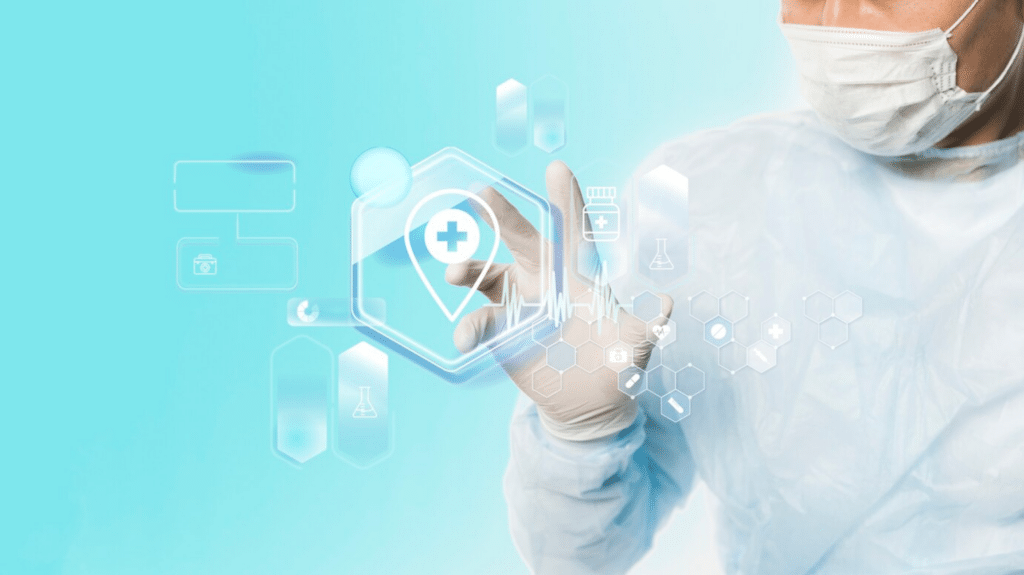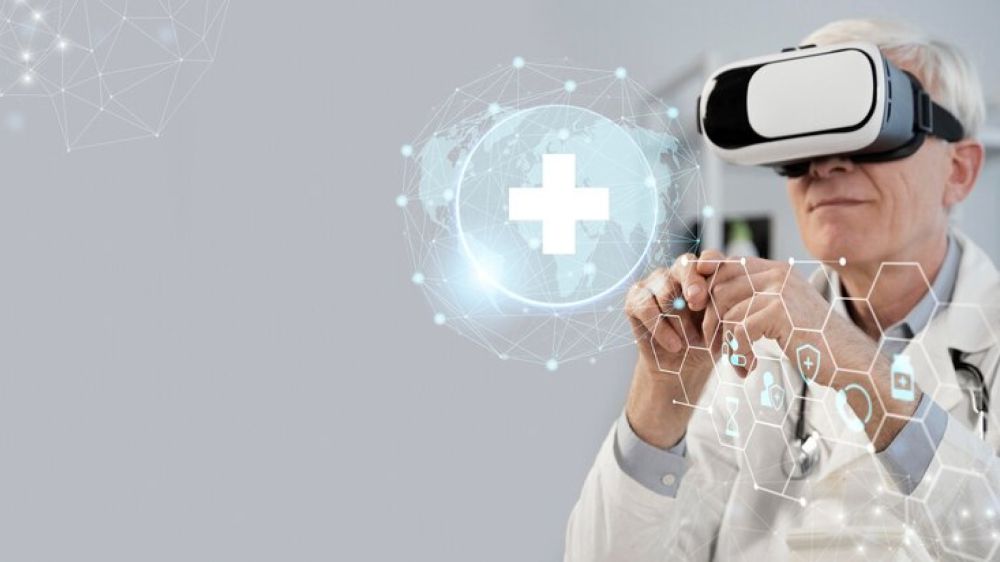Software as a Service (SaaS) has emerged as the go-to solution in the rapidly evolving healthcare landscape, enabling organizations to replace outdated systems with efficient and accessible tools for staff and patients. Projections indicate that this market will more than double, reaching an impressive $42.13 billion by 2027, with a compound annual growth rate (CAGR) of 18.2%. This is reshaping the industry, positioning healthcare software as a service as one of the most projectable trends of 2025.
This blog will explore the numerous benefits of healthcare software as a service, provide examples of leading solutions, discuss the challenges associated with implementation, and highlight emerging trends that are set to influence the future of healthcare.
What is Healthcare Software As A Service?
Healthcare software as a service (SaaS) refers to cloud-based software solutions specifically designed for the healthcare sector, allowing organizations to access and manage applications over the Internet instead of relying on local servers.

Initially met with skepticism due to concerns about data security, healthcare software as a service has gradually gained acceptance as security measures have advanced significantly. As a result, many healthcare providers have adopted healthcare software solutions to implement cost-effective tools such as electronic health records (EHRs), electronic medical records (EMRs), and telehealth platforms, enhancing both efficiency and patient care.
Moreover, the impact of healthcare SaaS plays a crucial role in supporting nonclinical systems like revenue cycle management (RCM), billing, and supply chain management, all of which are essential to the smooth operation of healthcare organizations. By streamlining these processes, healthcare software has become a transformative force in modernizing and optimizing healthcare operations across the board.
Benefits of Healthcare Software As A Service to Healthcare Organizations
Software as a Service (SaaS) has revolutionized healthcare operations, driving improvements in efficiency, cost management, and patient care.
Our experts have identified several key benefits that significantly impact both operational effectiveness and patient outcomes:
- Enhanced Accessibility
- Cost Efficiency
- Better Data Management
- Greater Collaboration
- Strengthened Security
- Better Patient Outcomes
1. Enhanced Accessibility
Medical professionals can access patient information from any location and at any time, enabling greater flexibility in care delivery and fostering seamless collaboration on patient cases remotely. Increased accessibility allows patients and doctors to engage directly through healthcare SaaS platform, ensuring both parties have access to up-to-date medical records, which significantly improves the continuity of care.
Furthermore, healthcare software as a service fosters collaboration by enabling authorized members to securely share information. Such capabilities allow doctors to develop treatment plans and consult on cases seamlessly, regardless of their physical locations. The application optimizes performance across various devices, including smartphones, tablets, and computers, ensuring healthcare teams can access critical data effortlessly.
2. Cost Efficiency
Healthcare software as a service applications are hosted by the vendor, eliminating the need for heavy hardware investments, and leading to substantial savings in initial setup costs. The model also reduces ongoing maintenance expenses, as updates and IT management are handled by the provider, which alleviates the financial burden on in-house IT staff.
Moreover, healthcare software helps healthcare providers avoid costly hardware upgrades and the associated downtime, freeing up funds to be reallocated toward other critical areas, such as improving patient care and upgrading facilities.
3. Better Data Management
Healthcare software as a service also offers a centralized system for handling patient data. Centralization simplifies the retrieval, organization, and management of information for healthcare professionals, enhancing overall operational flow. Additionally, healthcare software improves data sharing and communication across different healthcare systems by utilizing standards like SMART on FHIR, which helps maintain comprehensive and up-to-date patient records.
Furthermore, healthcare software solution supports advanced analytics, enabling healthcare organizations to identify patient needs and trends more effectively. Insights gained from data contribute to the development of better care strategies, ultimately enhancing patient care and operational efficiency.
4. Greater Collaboration
Greater collaboration enables seamless data sharing between departments and improves communication across healthcare teams. Healthcare SaaS ensures that all healthcare professionals have real-time access to the same patient information, enhancing collaboration and consistency across various roles and locations, and ultimately fostering more effective care coordination.
The use of centralized platforms, such as Hospital Management Systems (HMS), promotes more cohesive care delivery, particularly when multiple professionals are involved in patient management. These systems track tasks, monitor patient progress, and facilitate teamwork across departments, thereby enhancing operational efficiency. Additionally, synchronizing workflows and streamlining interdepartmental tasks contribute to improved revenue management, leading to a more integrated and effective care delivery process.
5. Strengthened Security
Strengthened security with robust measures like encryption and backups enhance the protection of sensitive patient data. Specialized security features within healthcare platforms address vulnerabilities that are often present in traditional healthcare systems, significantly reducing the risk of data breaches.
Compliance with regulations such as HIPAA ensures that confidential health records remain secure and private, safeguarding patient information. Healthcare software as a service vendor also brings expertise in data management and security, offering healthcare organizations confidence in the safety and integrity of their data.
6. Better Patient Outcomes
Improved data management and enhanced collaboration enable healthcare providers to make more informed decisions, resulting in tailored treatment plans that elevate the quality of patient care. Real-time access to patient information allows for timely interventions, reducing complications and improving overall health outcomes.
Enhanced communication among healthcare teams fosters coordinated care, ensuring that all providers are aligned on treatment strategies. Collaboration accelerates patient recovery and boosts patient satisfaction as the care delivered becomes more cohesive and responsive to individual needs. By facilitating these improvements, healthcare SaaS plays a vital role in promoting better health outcomes and overall patient well-being.
Best Examples of Healthcare Software As A Service
Here are some notable examples of healthcare software as a service that are shaping the industry, presenting the diverse capabilities available to healthcare providers today.

- Electronic Health Records (EHR) Systems
- Telehealth Software
- Medical Practice Management Systems
- Healthcare Data Analytics Tools
- Laboratory Information Systems (LIS)
1. Electronic Health Records (EHR) Systems
EHR systems allow healthcare providers to manage comprehensive patient records, including vital details like diagnoses, treatments, and medications. A centralized approach enhances care coordination and ensures all relevant information is easily accessible.
Effective EHR software also boosts operational efficiency by streamlining workflows, reducing administrative tasks, and ensuring accurate documentation. Leading platforms such as Epic, Cerner, and Allscripts are renowned for their robust capabilities and ability to integrate with other healthcare applications. Such interoperability fosters improved communication across systems, ultimately improving patient care and outcomes.
2. Telehealth Software
Telehealth software significantly enhances patient access to healthcare services by facilitating remote consultations and diagnoses, particularly benefiting those in underserved areas. Popular telemedicine platforms such as Teladoc, Doctor on Demand, and Amwell allow healthcare providers to offer online consultations, effectively addressing a wide range of primary medical issues.
These solutions improve patient convenience and enable healthcare professionals to manage their time more efficiently. As a result, providers can reach a broader audience, ultimately leading to improved health outcomes for patients.
3. Medical Practice Management Systems
Medical practice management systems enhance operational efficiency by streamlining essential processes such as patient scheduling, billing, and insurance claims processing for healthcare providers. Prominent examples of these systems include AdvancedMD, Kareo, and Athenahealth, each offering tailored solutions designed to meet the unique needs of various medical practices.
By centralizing administrative functions, these systems help reduce errors and improve revenue cycle management, allowing healthcare providers to dedicate more time to delivering quality patient care. The integration of these tools fosters a more organized and efficient practice environment, ultimately benefiting both healthcare professionals and patients.
4. Healthcare Data Analytics Tools
Healthcare data analytics tools empower organizations to analyze patient data effectively, resulting in improved health outcomes through data-driven decision-making. Notable examples of healthcare analytics software include IBM Watson Health, Cerner Millennium, and MedeAnalytics, each offering unique capabilities to enhance data insights.
By utilizing these analytics tools, healthcare organizations can identify trends, monitor performance, and develop targeted interventions. An analytical approach ultimately enhances patient care and operational efficiency, allowing providers to make informed decisions that positively impact health outcomes. The incorporation of data analytics into healthcare practices initiates a new era of preventive care.
5. Laboratory Information Systems (LIS)
Laboratory Information Systems (LIS) software plays a crucial role in managing test results and patient data within laboratory departments, streamlining workflows, and improving operational efficiency. Key examples of LIS software include Cerner PathNet, Sunquest, and McKesson LIS, each providing comprehensive tools for handling laboratory processes and data management.
By integrating LIS with other healthcare systems, laboratories enhance communication and data sharing, leading to improved patient care and more accurate test results. The integration guarantees timely access to essential information for healthcare providers, facilitating better clinical decisions and ultimately improving patient outcomes.
Challenges Associated with Implementing Healthcare Software As A Service?
While healthcare software as a service solution offers numerous advantages for healthcare organizations, its implementation is not without challenges. Understanding these hurdles is crucial for successful adoption.

Here are some key challenges associated with implementing healthcare software as a service in healthcare:
- Security and Compliance
- Interoperability
- Implementation and Integration
- Data Privacy
- Support and Maintenance
1. Security And Compliance
Security and compliance present major challenges when implementing healthcare software as a service in healthcare. Healthcare organizations must ensure that their custom healthcare software solutions complies with strict regulations like HIPAA, which mandates the protection of sensitive patient data. Failure to meet these regulatory standards can result in legal consequences and a loss of patient trust.
Implementing healthcare software as a service requires thorough vetting of vendors to confirm that their solutions adhere to all necessary security and compliance requirements. Without proper due diligence, organizations risk data breaches, non-compliance, and significant reputational damage, making security and compliance a top concern in the adoption of technology solutions in healthcare.
2. Interoperability
Interoperability poses a significant challenge for healthcare organizations implementing healthcare software solutions. New systems must integrate smoothly with existing software and databases to ensure seamless data exchange. Without proper integration, fragmented patient information can disrupt care coordination, negatively affecting patient outcomes.
Assessing the compatibility of healthcare software with current technology infrastructure is crucial to avoid these issues. Ensuring smooth integration helps maintain unified patient records and supports more efficient healthcare operations, making careful evaluation of healthcare SaaS platform an important step in the implementation process.
3. Implementation And Integration
Implementation and integration of healthcare software as a service in healthcare often involve a complex and time-consuming process that requires careful planning. Ensuring all systems work together smoothly without disrupting existing operations is crucial for success.
Healthcare organizations need to allocate adequate resources for training staff and managing the changes that come with new technology. Failing to do so may result in operational disruptions, which could negatively impact patient care. Proper planning and resource allocation are essential to navigating the integration process smoothly and maintaining quality care.
4. Data Privacy
Data privacy is a major concern for healthcare organizations when adopting healthcare software solutions. Protecting sensitive patient information requires ensuring that the software adheres to stringent privacy regulations and security standards.
Organizations must carefully assess healthcare software as a service vendors’ data protection measures, such as encryption, access controls, and regulatory compliance, to safeguard against unauthorized access and potential data breaches. Properly evaluating these security protocols is essential for maintaining the privacy and security of patient data throughout the implementation process.
5. Support And Maintenance
After implementing healthcare software solution, healthcare organizations must ensure they have sufficient resources and expertise for ongoing support and maintenance to keep systems running smoothly and resolve any emerging issues. Continuous staff training is also necessary to adapt to updates and new features, ensuring proper use and compliance with operational protocols.
Developing a clear plan for support and maintenance, including regular system evaluations and consistent communication with vendors, allows organizations to maximize the benefits of healthcare software as service solutions while minimizing any potential disruptions to patient care.
The Future of Software As A Service in the Healthcare Industry
The future of healthcare software as a service in this industry looks promising, with significant advancements set to transform the way care is delivered. Integration of AI and machine learning will enable personalized treatment plans and enhance decision-making processes, providing more tailored care for patients. Growth in remote patient monitoring solutions will increase patient engagement and allow for timely interventions, improving overall health management.

Predictive analytics will play a key role in early disease detection and proactive patient care, helping providers stay ahead of health issues. Cost-effective and scalable solutions will continue to make healthcare SaaS an attractive option for healthcare providers looking to boost operational efficiency.
Since healthcare software as a service continues to prove its value, it is poised to dominate the healthcare sector in the coming years, driving innovation and improving patient care on a broad scale.
Read more: How Will Technology Change the Future of Healthcare: 10 Software Companies Leading the Charge
Unlock Optimal Healthcare Software As A Service with KMS Healthcare
The rapid adoption of Healthcare software as a service is transforming the way healthcare organizations deliver patient care and manage their operations. With the growing demand for innovative solutions, healthcare software offers a way for providers to enhance efficiency while improving patient outcomes.
As healthcare organizations seek to implement these advancements, selecting the right partner becomes critical. KMS Healthcare is dedicated to offering tailored SaaS development services designed to meet the unique needs of the healthcare sector.
- Roadmap Planning: Create strategic product roadmaps aligned with your objectives, ensuring that your healthcare software solution meets market demands effectively.
- MVP Release Strategy: Launch minimum viable products that are market-ready and built for growth, allowing rapid adaptation based on user feedback.
- Expert Consulting: Leverage consulting expertise to refine product strategies, drawing from extensive industry experience to help exceed market expectations.
Ready to elevate your healthcare software as a service journey in healthcare? Contact KMS Healthcare today to learn how we can help.
